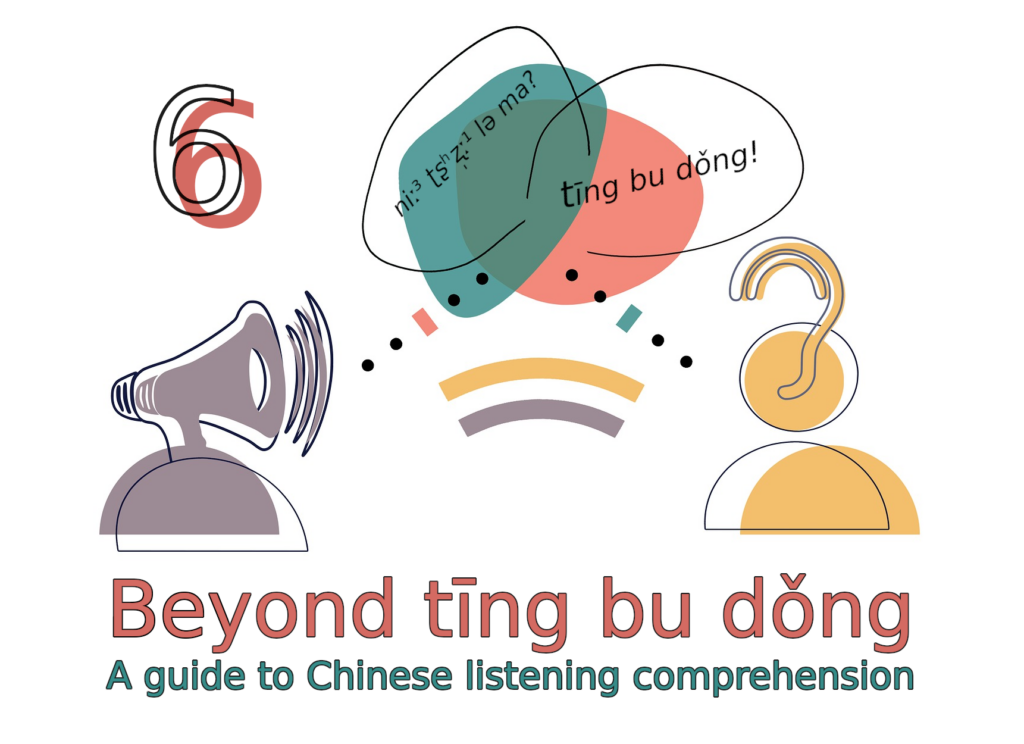 Many people assume that the hardest part of learning Chinese must be the characters or the tones, but it turns out that most learners struggle more with listening comprehension. Why is that, and what can you do about it?
Many people assume that the hardest part of learning Chinese must be the characters or the tones, but it turns out that most learners struggle more with listening comprehension. Why is that, and what can you do about it?
Characters and tones stand out because most students have not encountered them before learning Mandarin. Still, when I asked readers of Hacking Chinese which skill they struggled with the most, listening was the most common answer, not speaking, reading or writing.
Tune in to the Hacking Chinese Podcast to listen to the related episode:
Available on Apple Podcasts, Google Podcasts, Overcast, Spotify, YouTube and many other platforms!
The question of difficulty in language learning is far from straightforward. Saying that something is easy or hard is only meaningful in a subjective sense or if you compare learning one language with another, given a certain native language.
In this article, I will explain why listening comprehension in Chinese is so hard. There are some obvious reasons I’m sure many of you already know, but there are also some important factors I didn’t realise until grad school. Let’s have a look!
- Beyond tīng bu dǒng: A guide to Chinese listening comprehension
- Why listening is hard in general
- Why listening in Chinese in particular
- Beyond listening: Prior knowledge
- Conclusion: It’s not just you; listening in Chinese is hard
Beyond tīng bu dǒng: A guide to Chinese listening comprehension

This article is part of a series where we go beyond merely noting that we don’t understand something (tīng bu dǒng) to analyse why we don’t understand and by extension what we can do about it. While it’s recommended that you read or listen to the earlier articles before reading this one, I will refer to earlier articles when relevant. Here’s a list of the articles I’ve planned for this series. Article titles without links have not been published yet!
- A guide to Chinese listening comprehension
- From sound to meaning in Mandarin
- Using what you already know to aid listening comprehension in Chinese
- Learning to process spoken Mandarin quickly and effortlessly
- Becoming a better listener as a student of Chinese
- Why is listening in Chinese so hard?
- How to master different kinds of listening in Chinese
- Building an arsenal of Chinese listening strategies for every situation
- The best listening exercises to improve your Chinese
Why listening is hard in general
Before we discuss why listening is hard in Chinese in particular (and it is), let’s recap why listening comprehension is demanding in any language. This has been the focus of the previous articles in this series, so let’s summarise what I said there:
 To understand spoken Mandarin, we must extract information from the language we hear. We need to convert sound waves to speech sounds, segment connected speech into words and link them to meaning, and combine words into phrases and sentences that mean something. This is called bottom-up processing.
To understand spoken Mandarin, we must extract information from the language we hear. We need to convert sound waves to speech sounds, segment connected speech into words and link them to meaning, and combine words into phrases and sentences that mean something. This is called bottom-up processing. We also need to rely on things we already know to make sense of what we hear. To interpret spoken language, we need to draw on what we know not just about the language, but also about the world, the listening situation and what was said before. This is called top-down processing.
We also need to rely on things we already know to make sense of what we hear. To interpret spoken language, we need to draw on what we know not just about the language, but also about the world, the listening situation and what was said before. This is called top-down processing. For these processes to be fast enough, they need to be highly automated. We can focus our attention and improve listening comprehension in limited ways, but without ample listening experience that allows for automated processing, we stand no chance of understanding.
For these processes to be fast enough, they need to be highly automated. We can focus our attention and improve listening comprehension in limited ways, but without ample listening experience that allows for automated processing, we stand no chance of understanding. To be a successful listener, you also need to learn how to make the most of cognitive resources and manage emotional factors. Some of these things are hard to change, but most will improve with exposure and experience.
To be a successful listener, you also need to learn how to make the most of cognitive resources and manage emotional factors. Some of these things are hard to change, but most will improve with exposure and experience.
To add insult to injury, we’re often out of control when listening in the real world. When we speak, we can choose to use words we know but when others speak with us, they don’t know which words we have studied. When we read, we can do so at our own pace, but when listening, we often can’t influence how fast someone speaks.
In addition, authentic Mandarin is not structured the way your textbook might have you believe. Normal people don’t speak in sentences, and they occasionally violate (almost) every grammar rule you’ve learnt. Thus, it’s not strange that most listeners react to all this with a tīng bu dǒng!
If you want to read more about how native speakers are often “wrong”, I suggest you check out this article next:
Can native speakers be wrong about Chinese grammar and pronunciation?
Why listening in Chinese is particularly hard
There are several reasons to believe that listening in Chinese is indeed harder than in many other languages. Naturally, difficulty is relative, so languages you already know will directly impact how hard it is to learn subsequent languages.
My point here is that for most readers of this article, listening comprehension in Chinese is considerably harder than in French or Swedish.
1. Lack of familiar-sounding words: Starting from scratch
The most important reason Mandarin is difficult to understand is that you get almost nothing for free. When learning French as a native speaker of English, you are greatly helped by the large percentage of English words that originally come from French. Some words are identical, but even if they are not, resembling a word you already know makes understanding much easier.
This is particularly true when it comes to specialised vocabulary for things like science and technology. For example, I haven’t studied a word of Spanish, but ran into this sentence when listening to a podcast in French:
Si ustedes son principiantes en francés, hagan clic en el link de YouTube del episodio en la descripción de Spotify y activen los subtítulos para escuchar mientras leen y así comprender todo.
I can understand this easily because most of the keywords are the same in other languages I already speak. The same sentence in Chinese would be utterly incomprehensible to a beginner learner of Mandarin.
Even brand names are often transcribed beyond recognition for learners, something I discussed here: Lost in transcription: Saylaw, Ice Island and Aristotle. This makes it easier to access prior information and use that to aid your listening.
The challenge of starting from scratch is hard to overestimate. Since understanding is so crucial for learning, not understanding anything also means that you don’t learn anything. If I move to Germany tomorrow, without preparing, and spend a decent amount of effort learning German in situ, I will likely become rather fluent within a year simply by speaking with people (I’ve seen the reverse happen many times).
This is simply not true for Mandarin. Unless you reach a threshold for listening comprehension where you start being able to make sense of what people say, simply living in an immersion environment in itself doesn’t do much for you.
While you still need to engage with the language to learn it, the level of engagement required to get off the ground is much higher in a distant language like Mandarin, compared to a close language like French or German.
There’s plenty of research showing that processing words shared between languages is faster and more accurate than processing completely new words (e.g. Garrido Pozú, 2018; Andras et al., 2022), and this is also easy to show anecdotally, as I did above with the message in Spanish.
Essentially, this means that bottom-up processing is facilitated by words sounding similar, and that access to information via top-down processing is also easier to access because labels are more similar.
2. Too many similar-sounding words: Everything sounds the same
When I started learning Mandarin, felt that listening was hard because words just seemed to sound very similar to each other. I thought this was just a matter of experience, that I simply thought words sounded more similar, and that this would go away with more practice.
I was right, but only up to a point. Yes, beginners will perceive distinct sounds as the same or similar, but no, this is not just me or you, words in Mandarin really are more similar than in English.
 Limited syllable structure: If you’ve studied Chinese for a while or just looked at a Pinyin chart, you have probably noticed that there aren’t many allowed syllables. Non-beginners will be surprised when they stumble upon an entirely new syllable because it happens so rarely. Compare this when learning English, Swedish or French as a second language, where keeping track of “syllables I’ve encountered” is a fool’s errand. The two most important limitations on syllables in Mandarin are that they can only end in vowels, except for -n, -ng, and -r, and that there are now consonant clusters, so no “strength” or “sixty” exist. There are only some 20 initials and some 40 finals allowed, and many combinations of these are not allowed either, giving us some 1,000 syllables, including tones (more about these later). English has ten times as many possible syllables. Find Pinyin charts and other resources for learning pronunciation here.
Limited syllable structure: If you’ve studied Chinese for a while or just looked at a Pinyin chart, you have probably noticed that there aren’t many allowed syllables. Non-beginners will be surprised when they stumble upon an entirely new syllable because it happens so rarely. Compare this when learning English, Swedish or French as a second language, where keeping track of “syllables I’ve encountered” is a fool’s errand. The two most important limitations on syllables in Mandarin are that they can only end in vowels, except for -n, -ng, and -r, and that there are now consonant clusters, so no “strength” or “sixty” exist. There are only some 20 initials and some 40 finals allowed, and many combinations of these are not allowed either, giving us some 1,000 syllables, including tones (more about these later). English has ten times as many possible syllables. Find Pinyin charts and other resources for learning pronunciation here. Mixing up new sounds: While English and Mandarin have roughly the same number of sounds, they aren’t the same sounds. English has some sounds that native speakers of Chinese find difficult, such as the two “th” sounds (/θ and ð/), “z”, and “r”. Similarly, Mndarin has sounds you might not be used to, such as z, c, s, zh, ch, sh, j, q, x and ü. Many of these may sound similar if you haven’t sorted out the difference between them yet, which will make words that aren’t similar sound similar, so zài and cài sound the same, just like “ether” and “either” would sound the same if you ignore /θ/ and /ð/. This causes trouble when speaking Mandarin, but also when listening.
Mixing up new sounds: While English and Mandarin have roughly the same number of sounds, they aren’t the same sounds. English has some sounds that native speakers of Chinese find difficult, such as the two “th” sounds (/θ and ð/), “z”, and “r”. Similarly, Mndarin has sounds you might not be used to, such as z, c, s, zh, ch, sh, j, q, x and ü. Many of these may sound similar if you haven’t sorted out the difference between them yet, which will make words that aren’t similar sound similar, so zài and cài sound the same, just like “ether” and “either” would sound the same if you ignore /θ/ and /ð/. This causes trouble when speaking Mandarin, but also when listening.
The limited number of sounds and ways of combining them makes Mandarin easier to learn to speak and pronounce (all other things being equal, which they’re not), but it makes listening harder at the same time. This is a general pattern we will encounter again later, and it indeed seems to be true for languages in general.
A guide to Pinyin traps and pitfalls: Learning Mandarin pronunciation
Two additional factors can make words sound more similar: tones and word length, but I will discuss those separately below.
3. Tones pose an extra challenge: Learning them is important
To get to 1,000 possible syllables mentioned above, we multiply the 400 allowed combinations of initials and finals, then multiply this number with the four tones, ignoring combinations that don’t exist, such as góng, něng or béi.
However, if you find it difficult to hear the difference between tones, the number of syllables you hear drops dramatically, essentially cut in three if you are completely unable to hear the tones. As I’ve written elsewhere, this would be like listening to English while ignoring long and short vowels, making words like “live” and “leave” sound the same.
Thus, learning to hear the difference between sounds is crucial for both pronunciation and listening comprehension. This is an area I’ve done some research in myself and a topic I’ve been interested in for more than a decade now. For more about how you can learn to hear sounds and tones in Mandarin, check this article: Learning to hear the sounds and tones in Mandarin.
4. Mandarin has short words with lots of information per syllable
It’s common for students to think that languages with long words are harder to learn than those with short words, it might even seem self-evident to some. I mean, learning a word like “environmentally friendly” seems scarier than learning huánbǎo (环保).
This is true, at least when we are expected to actively recall and pronounce the word, but as we have seen a few times already, the reverse is true when listening.
Around 80% of commonly used words in Mandarin have two syllables, which means that it’s easier to pronounce (fewer syllables to keep track of), but also that since almost all words have the same length, they are easier to mix up and confuse with each other, especially when combined with the factors discussed earlier.
A word like “environmentally friendly” is not easily mixed up with anything else, but huánbǎo (环保) has many near-homophones in Mandarin that only differ in one tone, initial or final.
In general, languages tend to convey the same amount of information per unit of time (Coupé et al., 2019). This is likely because we all share the same hardware, and our brains are only able to process information so quickly. Languages differ in rate of speech, however, so speakers of some languages tend to have more syllables per second than others.
As a consequence, this also means that languages with more syllables also contain less information per syllable, partly because of the redundancy I mentioned earlier and partly because words are simply longer.
If “environmentally friendly” and huánbǎo (环保) convey the same information, it’s clear that the former has much less (one-fourth) information per syllable. This means that each word contains more information, which can be harder to decode or keep track of as a second-language learner.
5. The necessity to rely more on context makes listening harder
Let’s move on to some less obvious reasons why listening in Chinese is hard.
Languages differ in how they encode information. In some languages, lots of information is encoded on the word level, meaning that you can look at a word and know a great deal about the context it appears in just by how it’s inflected, which prefixes and suffixes are attached and so on.
For example, in English, we know that “her” is the object of a sentence without knowing what the sentence is, so “I love her” and “her I love” both mean that there is a female person I love. By looking at the verb, we can also see that it’s present tense (otherwise it would have been “loved”) and that the subject is not in the third person (because then it would have been “loves”).
This creates redundancy in sentences in English, and even more so in languages like French or Latin, meaning that the same information is encoded more than once. All languages have redundancies, of course, but languages like French and Latin force you to encode much more information on the word level.
Let’s look at another example! In the sentence “the neighbour’s dog bit me yesterday”, we know that it’s past tense both from the inflection of the verb, “bit”, and by the fact that “yesterday” is included in the sentence. Technically, we could have said “neighbour’s dog bite me yesterday” and it would have conveyed exactly the same information.
And that’s indeed how Chinese works:
- No tenses: wǒ zuótiān xúe zhōngwén (我昨天学中文), “Istudied Chinese yesterday”,wo jīntiān xué zhōngwén (我今天学中文), “I study Chinese today”, wo míngtiān xué zhōngwén, (我明天学中文), “will study Chinese tomorrow”. While you might want to add auxiliary verbs or particles depending on the context, the fact remains that xué (学) means “study” and that Chinese doesn’t have tenses.
- No articles: In English, “a person has arrived” and “the person has arrived” indicate which bit of the sentence is already known (with the definite article, the person is known, otherwise not). In Chinese, there are no articles, and while we can use words like zhège (这个) to indicate a specific instance of something, this is more often dealt with using word order. Compare rén lái le (人来了) and lái le rén (来了人), where the first would be closer to using the definite article in English and the second would be closer to using the indefinite article.
- Parts of speech are hard to tell apart: English marks parts of speech in many ways, so you can guess that anything with “-ly” at the end is an adverb, things with “-ion” at the end are probably nouns, and so on. Chinese does this too, especially with verb particles, but not as much. Also, some words can be used as nouns, adjectives and verbs, but still sound exactly the same. For example, bīng (冰) can mean a noun (“ice”), an adjective (“ice cold”) or a verb (“to cool something with ice; to feel cold”)
- Words often sound the same in singular and plural: wǒ shì xuésheng (我是学生), “I am a student”, vs. tā yǒu shí gè xuésheng (他有十个学生), “he has ten students”.
- You can’t hear the difference between “he” and “she”: tā yǒu shí gè xuésheng (他有十个学生), “he has ten students”. vs. tā yǒu shí gè xuésheng (她有十个学生), “she has ten students”.
As a beginner, this seems great, because in comparison with other foreign languages, you might have learnt, Chinese looks so easy! Indeed, one of the most common reasons high-school students choose to learn Mandarin is because they heard that it will allow them to escape the tyranny of verb inflection tables in French or Spanish, or the pain of German articles and cases.
The problem is that while this is true in theory, it would be wrong to think that this information is just lost in Chinese. Instead, most of it can be inferred from context. As I pointed out in the example with the neighbour’s dog above, we don’t have to inflect the verb to know that it’s past tense; we know that because it happened “yesterday”. We know if it’s “he” or “she” because, in real life, we usually know whom the speaker is referring to.
In Mandarin, you just need to include relevant information once, or occasionally to remind the listener or reading. For example, most stories relate events that happened in the past, so in English, we use the past tense. If you pick a random sentence, you can see it talks about the past, because the main verbs are in past tense.
If you do the same in a Chinese story, you often won’t be able to tell when the event took place. You might start a story with cóng qián (从前) or yǒu yī tiān (有一天), but you don’t include that in every sentence. This puts a heavier load on the listener because you need to keep track of all these things to make sense of what you listen to. Naturally, if you don’t understand the context or missed something important earlier, picking it up later becomes much harder.
As mentioned above, this is another example of something that makes Mandarin easier to learn to speak, because you don’t need to keep track of tenses, gender, number, articles and so on, but it also makes listening harder, because you need to infer all these things from context.
6. Formal Chinese is even more concise and dense
It’s worth pointing out that while it’s true that spoken Mandarin has shorter words than English on average, this is even more true when it comes to written Chinese. The most extreme case of this is Classical Chinese, which is largely monosyllabic (one character per word).
Now, this article is about why listening in Chinese is hard, not why reading it is difficult, but the reason I want to bring it up here is that we often do listen to written language read aloud, such as in news broadcasts, planned presentations or scripted podcasts.
Mandarin read aloud is much harder to understand than naturally spoken language, simply because it’s even more concise and dense with information.
An example of this is the large number of contractions that written Chinese use to make the language more concise, often to squeeze longer words into a strict two-syllable format. Some examples:
- 中美 (zhōngměi) instead of 中国和美国 (zhōngguó hé měiguó), meaning China and the United States.
- 经贸 (jīngmào) instead of 经济贸易 (jīngjì màoyì), meaning economy and trade.
- 科研 (kēyán) – From 科学研究 (kēxué yánjiū), meaning scientific research.
If these pop up in your listening materials and you’re not prepared for them, it will be hard to understand. If your Chinese is good enough and you’re able to apply top-down processing, you can figure them out given context, however. In written form, it’s much easier, because most words that sound the same are written using different characters.
7: Regional variants and accented Mandarin
Many people in China don’t speak Mandarin as their first language. This means that people you meet may have learnt Mandarin in school, heard it on radio and TV and perhaps spoken it in formal education, at work or when travelling, but they don’t speak it at home or with their friends.
When they speak Mandarin with you, they do so with an accent, borrowing vocabulary, grammatical structures and, most importantly, pronunciation, from their native tongue. Everybody has an accent, of course, it’s just that some are officially actioned and others are not.
This is not to confuse with so-called Chinese “dialects”, such as Cantonese or Hokkien, which for listening purposes, might as well be treated as separate languages. A language is after all a dialect with an army and a navy.
What I’m talking about here is when native speakers of these dialects speak Mandarin borrow features from Cantonese or Hokkien when they speak Mandarin. If you want to read more about regionally accented Mandarin here: Learning to understand regionally accented Mandarin.
The point is that apart from understanding clearly pronounced, standard Mandarin, you also need to deal with dozens of common variations and accents, many of which merge sounds, reducing the number of syllables further, thus making listening even harder.
This is of course not unique to learning Chinese, but it is certainly a more pronounced (hehe) challenge compared with many other languages, especially smaller ones. I mean, there are different accents in Sweden too, and some dialects are different to the point where native speakers might find them hard to understand, but there are only a few of them and those that are hard to understand are often local.
More than a billion people live in China and the diversity is so enormous it’s hard to grasp. English, Spanish and Arabic of course also have vast differences in how they are spoken in different areas, so the challenge is real there, too.
Beyond listening: Prior knowledge
For the sake of completeness, I also want to point out that listening in Chinese is often hard because of the content, not the language. Most students know less about Chinese culture, history and society than they do about similar areas in a language more closely related to their first language. Since successful listening depends on being able to draw on relevant prior knowledge, it goes without saying that this is hard if said knowledge is missing.
This is not only true for world knowledge (the examples I gave above), but also knowledge about social codes, how interaction works in specific situations, what one expects to be said by whom and when, and so on. Understanding all the words isn’t nearly enough to understand the intended message, something we spent the entirety of part 3 in this series talking about!
Beyond tīng bu dǒng, part 3: Using what you already know to aid listening comprehension in Chinese
Conclusion: It’s not just you, listening in Chinese is very hard
So no, you’re not just imagining it, listening in Chinese is difficult. Listening in a foreign language is hard in general, but as we have seen, listening in Chinese is particularly difficult.
I realise that this is not very encouraging, but I strongly believe that challenges are best overcome by examining them more closely and finding ways forward based on what you learn. This is indeed what language hacking, and therefore Hacking Chinese, is all about!
I have already provided links to articles that will help you deal with some of the challenges brought up in this article, but the general advice remains the same as always: listen more. Most of these things will come with more exposure and experience.
Naturally, what you listen to and how you listen also matter, but quantity still is king. You want comprehensible input and you want a lot of it!
I’m currently building a course to help you improve your listening ability, no matter what level you’re on. If you’re interested, you can learn more and sign up for the waiting list here. The more people who sign up, the more it will encourage me to work on the course!
The Fluent Listener: Navigating Mandarin Like a Fish in Water
In the meantime, I hope this article has given you valuable insights into why listening in Chinese is hard and helps you move beyond tīng bu dǒng!
References and further reading
Andras, F., Rivera, M., Bajo, T., Dussias, P. E., & Paolieri, D. (2022). Cognate facilitation effect during auditory comprehension of a second language: A visual world eye-tracking study. International Journal of Bilingualism, 26(4), 405-425.
Coupé, C., Oh, Y. M., Dediu, D., & Pellegrino, F. (2019). Different languages, similar encoding efficiency: Comparable information rates across the human communicative niche. Science advances, 5(9), eaaw2594.
Field, J. (2009). Listening in the Language Classroom. Cambridge University Press.
Garrido Pozú, J. J. (2018). Aural Processing of Cognates in Learners of Spanish as a Second Language (Master’s thesis).
Rost, M. (2011). Teaching and researching: Listening (2nd ed.). Routledge.
Vandergrift, L., & Goh, C. (2012). Teaching and learning second language listening: Metacognition in action. Routledge.

Tips and tricks for how to learn Chinese directly in your inbox
I've been learning and teaching Chinese for more than a decade. My goal is to help you find a way of learning that works for you. Sign up to my newsletter for a 7-day crash course in how to learn, as well as weekly ideas for how to improve your learning!
20 comments
Dear Olle,
I enjoyed listening to this article during dinner quite a lot! I would like to add that, for an advanced learner who occasionally tunes in to Chinese news or similar shows, contractions of terms that the average Chinese person might be familiar with is yet another hurdle to listening.
Amen to that. And so often it seems a word or phrase that is relatively unambiguous gets shortened into something easily confused with other things.
Yes, contractions are a real problem, especially in anything formal! I spent a lot of time listening to news broadcast for a while and most of the passages I gave up on and had to look up where contractions, abbreviations or other succinct ways of expressing something that I would easily have understood in the full form. The more formal it is, the worse it gets!
Thanks Olle, glad to hear it’s not just me. I’ve been living in China and learning Chinese for two years and still hardly understand a thing….
“it is certainly a more pronounced (hehe) challenge”
You rang?
I never thought these things mattered too much but they’re true and may affect me more than I realize. Compared to my better listening of French and Japanese, which at times has even been better than my speaking, I did find it a bit odd that my Chinese listening skill is so much lower than my speaking. A lack of vocabulary and fully understanding the vocabulary I do know makes it worse. For example, I often run into the situation where they say a word similar to one I know, maybe even sharing a character. If I understand that character, I’ll often make the inference and get a general idea of what that word was, but if I don’t, I’m stuck. Of course, rarely is a single word the big issue, but this is the example that came to me.
As for ideas on how to get better, I’d personally recommend learning and trying to copy some accents, Especially it you’re at least at a level to manage some basic conversation. I limit my erhua to only northerners / those who speak with it. When I went to Taiwan, I knew the accent and vocab would be an issue so I spoke in their accent and used their words.
Instead of letting your brain get surprised when you encounter non-standard speech, warm up, adapt, and momentarily live in it so your brain is accustomed and ready.
Yes, vocabulary is, I would say, the biggest problem with listening ability. In fact, that was the conclusion of an old series of articles I wrote about listening ability, where I analysed problems, one of which is “lack of vocabulary”. This is, strictly speaking, not related to listening ability directly, but that’s where the problem is most noticeable. You can check out the article series here:
Chinese listening strategies: Problem analysis
Regarding how to get better, mimicking and otherwise familiarising oneself with other dialects is essential. I think the biggest shock is if you’ve had only one teacher in your home country, in which case you’re in for a very rough awakening. This happens to me all the time, which is somewhat annoying, but still understandable. I mean, when travelling in China, I can communicate flawlessly with person #1, but then person #2 comes a long and suddenly I’m kicked back to some kind of lower intermediate listening level. They usually understand everything I say, but I feel so bad that I don’t understand what they’re saying. This will of course always happen and it happens to native speakers too, but it can still be frustrating. Cab drivers is a good example. 🙂
I noticed that cab problem happening even to a native speaker (she annoyingly said to a didi driver on the phone, that she could not understand his putonghua, and later even complained to me saying people from that province speak very weird Mandarin (she was from Haerbin and the driver was from Xian).
thanks for the recording it was wonderful! i’m usually to lazy to read that much of a text but this time i was listening on the way to work and it was great, thanks for insightful and wonderful article:)
I love audio recordings for this reason. I consume enormous amounts of audio material (audio books, audio versions of certain magazines, podcasts). I want to be able to provide this for Hacking Chinese, just need to know that enough people really want it. We’ll see!
listened to this article while preparing a meal
Perfect, 一石二鸟!
It’s been a long road, but my listening is about ready to take HSK5 exam.
But still, even at this point, I occasionally miss a whole sentence or even more. Because if I get the context wrong, or fixate on one word (e.g. if a word took a little effort to pull out of the memory banks), I can miss a whole stream of words in the meantime.
Wow!
Everyday really is a school day! I always thought it was just because Chinese, sorry, Mandarin, was a tonal language, or is that only partially the reality?
Thanks
Well, the article you left a comment to answers your question, so I’m not sure what I can add to make it clearer. 🙂
It struck me some years ago that there is another fundamental difference between the listening skills of a tonal language speaker and those of most Indo-European languages: the former are listening for vowels and the latter, by and large, for consonants. That’s why native Mandarin speakers often drop consonantas, particularly endings such as “-ed” in English. That lack of attention to the detail of consonants is the corrolary of our relatively poor ability to manipulate tones.
I don’t know about the first bit (i.e. I have no idea), but I’m sceptical about the second part. I think the reason they (mainly referring to speakers of Chinese here) drop endings is because of syllable structure more than anything else. If you come from a language that only allows three consonant sound at the end of syllables and no complicated consonant clusters, it’s going to be hard to pronounce words like “talked” or “practised”. This can be heard sometimes when people insert extra vowels to conform to the syllable structure of their native language. An example would a cluster like “st” in “study”, pronounced as “sətudy” to avoid the cluster. The same thing can be achieved in words like “talked” by simply omitting the ending.
I guess this would be possible to test by checking if they drop “-ed” more often when it’s part of a consonant cluster compared to if it appears directly after a vowel. I have never really studied this topic, though, maybe there already are such studies?
Another factor worth considering is grammar and morphology. Native speakers of Chinese are not used to the whole idea of adding seemingly arbitrary, small sounds to the end of words to make them fit in a sentence. Sure, we have some particles in Chinese too, but I think we can agree that’s not really the same thing.
Great article, it’s reassuring I’m not the only one that finds this. Another factor you didn’t mention here (although it’s related to the redundancy issue) is that Chinese is an incredibly concise language. The vast majority of words are no longer than two syllables, and the sentence structure is quite simple and parsimonious. This means that when you are listening to a stream of speech in Chinese, much more semantic information is encoded in a much smaller space of time than would be the case for a European language, which gives less time for your non-native brain to process it. I find this effect is even more pronounced for more formal Chinese (due to the presence of classical structures).
I think people often assume that languages with longer words (like Russian or German) are harder to learn, but I think they are actually much easier as it slows down the semantic onslaught when listening, and also gives you more means by which to differentiate words both when hearing them and learning them.
This is a ludicrously late reply to your insightful comment! I must have missed the comment when you posted it and only saw it now when I’m working on a revised version of this article. Anyway, I think you bring up several important points that I will consider adding to the article itself.
1) Formal Chinese being very dense. I think this is definitely true for Chinese read aloud, more so than for other languages. It’s probably the case that formal language tends to be more concise in general, but the strong. preference for two syllable words and contractions in formal, written Chinese makes this much harder. I don’t think Chinese is more information-dense than other languages in general; all the studies I’ve seen about spoken language tend to say that the information conveyed is about the same, so languages that have more syllables per minute also has less information per syllable. This tallies well with your second point, which I will also add.
2) Short words are harder than long words. I completely agree with your statement that people mistakenly tend to think that the opposite is true. I mean, longer words are harder to say, but certainly not harder to hear. In my native Swedish, we have some rather long words, and it goes without saying that longer words are more different from each other than shorter words. The fact that they are said faster doesn’t make them harder to hear, because they are still more different from each other than comparable words in Chinese. The distance between “university professor” and the acoustically closest alternative in English that doesn’t include either of those words is very far compared to 大学教授 in Chinese.
So, late reply to your comment, but thank you for posting it nonetheless!
Great article, covers virtually every aspect of Chinese that makes listening particularly hard. Some aspects I hadn’t thought much about, such as the fact that words have fewer syllables than English and other western tongues, and each syllable is loaded with semantics (unlike English, where morphemes can be of many syllables, whereas virtually every syllable in Chinese is a morpheme.) Also, many of your examples can be put in the category of “Chinese is more informationally context dependent, requiring more interpretation on the part of the listener.” This is a quite controversial claim, but I think it’s pretty valid, and some of your examples support it. Good post!
Originally, the article was only about that claim. For people who have been learning Chinese for a while, many of the other factors are obvious and, therefore, not very interesting, but that one stands out to me as clearly true when I first heard it in grad school, although hard to prove. My plan is to revisit this topic separately at some point, but whether that’s later this year or 2030 I don’t know. 🙂 Btw, I almost called the article “Why Listening in Chinese So Damn Hard” as a hommage, but decided not to for various reasons.